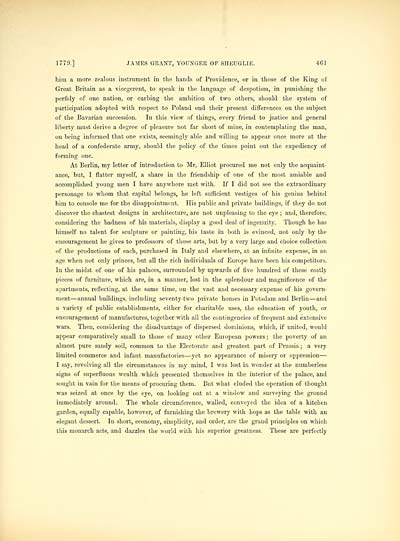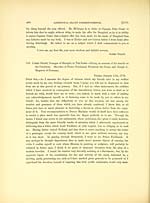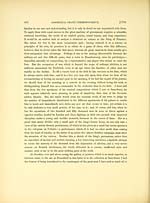Chiefs of Grant > Correspondence
(543)
Download files
Complete book:
Individual page:
Thumbnail gallery: Grid view | List view

1779.] JAMES GRANT, YOUNGER OF SHEUGLIE. 461
him a more zealous instrument in the hands of Providence, or in those of the King of
Great Britain as a vicegerent, to speak in the language of despotism, in punishing the
perfidy of one nation, or curbing the ambition of two others, should the system of
participation adopted with respect to Poland end their present differences on the subject
of the Bavarian succession. In this view of things, every friend to justice and general
liberty must derive a degree of pleasure not far short of mine, in contemplating the man,
on being informed that one exists, seemingly able and willing to appear once more at the
head of a confederate army, should the policy of the times point out the expediency of
forming one.
At Berlin, my letter of introduction to Mr. Elliot procured me not only the acquaint-
ance, but, I flatter myself, a share in the friendship of one of the most amiable and
accomplished young men I have anywhere met with. If I did not see the extraordinary
personage to whom that capital belongs, he left sufficient vestiges of his genius behind
him to console me for the disappointment. His public and private buildings, if they do not
discover the chastest designs in architecture, are not unpleasing to the eye ; and, therefore,
considering the badness of his materials, display a good deal of ingenuity. Though he has
himself no talent for sculpture or painting, his taste in both is evinced, not only by the
encouragement he gives to professors of those arts, but by a very large and choice collection
of the productions of each, purchased in Italy and elsewhere, at an infinite expense, in an
age when not only princes, but all the rich individuals of Europe have been his competitors.
In the midst of one of his palaces, surrounded by upwards of five hundred of these costly
pieces of furniture, which are, in a manner, lost in the splendour and magnificence of the
apartments, reflecting, at the same time, on the vast and necessary expense of his govern-
ment — annual buildings, including seventy-two private houses in Potsdam and Berlin — and
a variety of public establishments, either for charitable uses, the education of youth, or
encouragement of manufactures, together with all the contingencies of frequent and extensive
wars. Then, considering the disadvantage of dispersed dominions, which, if united, would
appear comparatively small to those of many other European pjowers ; the poverty of an
almost pure sandy soil, common to the Electorate and greatest part of Prussia; a very
limited commerce and infant manufactories — yet no appearance of misery or oppression —
I say, revolving all the circumstances in my mind, I was lost in wonder at the numberless
signs of superfluous wealth which presented themselves in the interior of the palace, and
sought in vain for the means of procuring them. But what eluded the operation of thought
was seized at once by the eye, on looking out at a window and surveying the ground
immediately around. The whole circumference, walled, conveyed the idea of a kitchen
garden, equally capable, however, of furnishing the brewery with hops as the table with an
elegant dessert. In short, economy, simplicity, and order, are the grand principles on which
this monarch acts, and dazzles the world with his superior greatness. These are perfectly
him a more zealous instrument in the hands of Providence, or in those of the King of
Great Britain as a vicegerent, to speak in the language of despotism, in punishing the
perfidy of one nation, or curbing the ambition of two others, should the system of
participation adopted with respect to Poland end their present differences on the subject
of the Bavarian succession. In this view of things, every friend to justice and general
liberty must derive a degree of pleasure not far short of mine, in contemplating the man,
on being informed that one exists, seemingly able and willing to appear once more at the
head of a confederate army, should the policy of the times point out the expediency of
forming one.
At Berlin, my letter of introduction to Mr. Elliot procured me not only the acquaint-
ance, but, I flatter myself, a share in the friendship of one of the most amiable and
accomplished young men I have anywhere met with. If I did not see the extraordinary
personage to whom that capital belongs, he left sufficient vestiges of his genius behind
him to console me for the disappointment. His public and private buildings, if they do not
discover the chastest designs in architecture, are not unpleasing to the eye ; and, therefore,
considering the badness of his materials, display a good deal of ingenuity. Though he has
himself no talent for sculpture or painting, his taste in both is evinced, not only by the
encouragement he gives to professors of those arts, but by a very large and choice collection
of the productions of each, purchased in Italy and elsewhere, at an infinite expense, in an
age when not only princes, but all the rich individuals of Europe have been his competitors.
In the midst of one of his palaces, surrounded by upwards of five hundred of these costly
pieces of furniture, which are, in a manner, lost in the splendour and magnificence of the
apartments, reflecting, at the same time, on the vast and necessary expense of his govern-
ment — annual buildings, including seventy-two private houses in Potsdam and Berlin — and
a variety of public establishments, either for charitable uses, the education of youth, or
encouragement of manufactures, together with all the contingencies of frequent and extensive
wars. Then, considering the disadvantage of dispersed dominions, which, if united, would
appear comparatively small to those of many other European pjowers ; the poverty of an
almost pure sandy soil, common to the Electorate and greatest part of Prussia; a very
limited commerce and infant manufactories — yet no appearance of misery or oppression —
I say, revolving all the circumstances in my mind, I was lost in wonder at the numberless
signs of superfluous wealth which presented themselves in the interior of the palace, and
sought in vain for the means of procuring them. But what eluded the operation of thought
was seized at once by the eye, on looking out at a window and surveying the ground
immediately around. The whole circumference, walled, conveyed the idea of a kitchen
garden, equally capable, however, of furnishing the brewery with hops as the table with an
elegant dessert. In short, economy, simplicity, and order, are the grand principles on which
this monarch acts, and dazzles the world with his superior greatness. These are perfectly
Set display mode to:
![]() Universal Viewer |
Universal Viewer | ![]() Mirador |
Large image | Transcription
Mirador |
Large image | Transcription
Images and transcriptions on this page, including medium image downloads, may be used under the Creative Commons Attribution 4.0 International Licence unless otherwise stated. ![]()
| Histories of Scottish families > Chiefs of Grant > Correspondence > (543) |
|---|
| Permanent URL | https://digital.nls.uk/96825074 |
|---|
| Attribution and copyright: |
|
|---|
| Description | A selection of almost 400 printed items relating to the history of Scottish families, mostly dating from the 19th and early 20th centuries. Includes memoirs, genealogies and clan histories, with a few produced by emigrant families. The earliest family history goes back to AD 916. |
|---|

